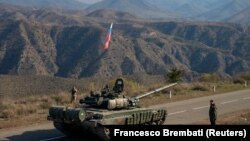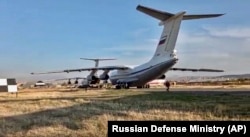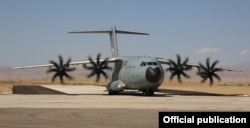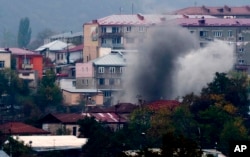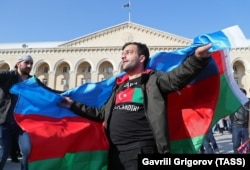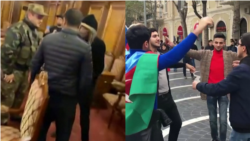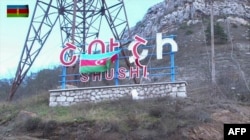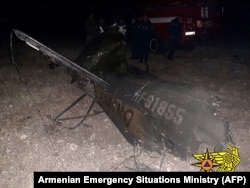Azerbaijan may have made territorial gains and Armenia may have “preserved” Nagorno Karabakh’s ethnic Armenian separatist leadership, but international analysts say that Russia appears the ultimate beneficiary of the November 9 agreement to end the two countries’ fighting over breakaway Nagorno Karabakh.
The deal, brokered by Russian President Vladimir Putin, inserts Russia into the only South Caucasus territorial dispute in which, for the past 26 years, it has had no official on-the-ground role.
The agreement, which ends over a month of combat, appears to be a “geopolitical victory for [Russian President Vladimir] Putin, since Russia will deploy peacekeepers to the current line of contact,” tweeted Michael Carpenter, a senior advisor to U.S. President-Elect Joe Biden and a former assistant U.S. defense secretary.
Already, 10 Russian IL-76 military cargo planes have delivered soldiers from the country’s 15th Separate Motorized Rifle Brigade, a peacekeeping unit, to the conflict zone, the Russian news agency Interfax reported.
Equipped with 90 armored personnel carriers and an array of other vehicles, the 1,960-person Russian “peacekeeping contingent” will monitor the line of contact between Azerbaijan and Armenia in Nagorno Karabakh for the next five years in an “automatically” renewable mission. These soldiers also will have “control over” the Lachin Corridor, a 5-kilometer-wide strip of territory, previously occupied by Armenia, that connects Karabakh with Armenia.
The rest of the Lachin region is scheduled to return to Azerbaijan on December 1, 2020. Other territorial handovers are also scheduled.
Russian border guards, who already defend Armenia’s Turkish and Iranian borders, will also execute “control” over transportation between western Azerbaijan and the strategic Azerbaijani exclave of Nakhchivan, the Aliyev family's homeland, which borders on Armenia. Details were not provided.
Moscow, for its part, maintains that the agreement will finally end more than 26 years of sporadic fighting since a 1994 ceasefire that decades of talks overseen by the Organization for Security and Cooperation in Europe’s Minsk Group have not been able to resolve. The latest outbreak of violence, which began on September 27, is estimated to have displaced, wounded, or killed thousands on all sides.
“We presume that the agreements reached will set up the necessary conditions for the lasting and full-format settlement of the Nagorno-Karabakh crisis,” President Putin said in a November 9 address.
But not all observers are so confident. The accord appears to contain potential stumbling blocks for all signatories, they say.
The first concerns the peacekeepers themselves. Although the Putin accord mentions only Russian peacekeepers, Azerbaijani President Ilham Aliyev has assured Azerbaijanis that Turkey, Azerbaijan’s closest strategic ally throughout the Karabakh war, will also be in the conflict zone.
Both Russian and Turkish armed forces will work in a peacekeeping center to improve “the effectiveness of control” over “implementation of the agreements,” Aliyev stated on November 10. “Thus, Turkey will officially play a role in the future settlement of the conflict and monitoring the ceasefire,” he said.
Any such joint Turkish-Russian peacekeeping center would resemble Syria, where both countries run joint patrols and monitor the ceasefire between the government and rebels, observed Ukrainian international-relations analyst Iliya Kusa.
But Russian President Vladimir Putin’s spokesman, Dmitry Peskov, does not see it that way.
“The sides did not agree about this,” Peskov told reporters on November 10. “The arrival of Turkish soldiers in Karabakh was not agreed.”
Turkey, which has been speaking directly with Russia about the conflict, has not responded officially to Aliyev’s claims. Turkish media, however, reported that “talks on the issue are ongoing.”
For all of Peskov’s denials, Russia may well end up making room for Turkey, according to Carnegie Moscow analyst Alexander Gabuev.
“I haven’t met any senior Russian official who believes that Moscow will ever be able to be in full control in the South Caucasus with no other powers in the mix,” tweeted Gabuev.
Yet, arguably, any role for Turkish peacekeepers in Karabakh could place Armenian Prime Minister Nikol Pashinian in political jeopardy.
Memories of Ottoman Turkey’s massacre of hundreds of thousands of ethnic Armenians during World War I still run strong in Armenia. Some Armenians on social media argue that allowing today’s Turkey into Karabakh would amount to “a second genocide.”
For the past 27 years, Turkey, which has no diplomatic ties with Yerevan, has run an economic blockade against Armenia over the Karabakh conflict.
Nagorno-Karabakh specialist Thomas de Waal, though, speculated to the podcast Ahval that, once Turkish President Recep Tayyip Erdogan leaves office, the Armenian-Azerbaijani accord could lead to a reconciliation between Yerevan and Ankara.
Right now, Pashinian does not appear to have the political capital for such a sensitive move.
Shortly after the prime minister announced on Facebook that he had signed the peace agreement, calling it “unspeakably painful for me and for our people” but “the best possible solution for the current situation,” angry protesters stormed into the Armenian parliament, government headquarters, and the Pashinian residence itself.
Armenia’s parliamentary speaker, Ararat Mirzoyan, was attacked and hospitalized, while Pashinian reported that a computer, clock, perfume, and driver’s licenses had been stolen from his home.
Amidst this violence, the prime minister’s former mentor, ex-Armenian President Levon Ter-Petrosian, who led Armenia during the 1992-1994 Karabakh war, called on Armenians “to avoid the danger of civil war and overcome domestic political differences exclusively by constitutional means.”
Russia, however, which has an army base in northwestern Armenia, might not be entirely sorry to see Pashinian and his relatively liberal government go, Alexander Baunov, a senior fellow at the Carnegie Moscow Center think-tank, wrote last month.
Armenian media regularly publish criticism of Russia and praise of the West, while Pashinian’s government “welcomes” Western non-governmental organizations, and has prosecuted Armenia’s Moscow-friendly former president, Robert Kocharian, on criminal charges, Baunov elaborated.
On November 10, Konstantin Zatulin, the first deputy chairman of the Russian parliament’s Committee on Commonwealth of Independent States Affairs, predicted Pashinian ultimately would resign. “His days as leader of the country are practically numbered,” Zatulin commented to Gazeta.ru.
Yerevan-based security expert Richard Giragosian, head of the Regional Studies Center, however, questions such forecasts. The protests were “a natural response to a defeat” and “a forced agreement” for which the Armenian government “did very little to prepare society …” he commented to the BBC’s Newshour.
Russia, seeking “revenge” for the 2018 peaceful uprising that brought Pashinian to power, is more the long-term risk, added Giragosian, a former consultant for the U.S. Defense and State Departments.
“Russian peacekeepers are the only guarantor of regional security and stability and that worries me.”
For many ordinary Azerbaijanis on social media, Baku’s motivation for agreeing to Russian peacekeepers within Karabakh – not a role it embraced in the past – also is problematic.
Ukrainian international-relations analyst Kusa, however, does not exclude that the peace deal, which went into effect after Azerbaijan accidentally shot down a Russian military helicopter near Nakhshivan, could prove “temporary.”
Riding on a wave of popular support for reclaiming Armenian-occupied territory, Baku has repeatedly made plain that it intends to regain control of all of Nagorno Karabakh. Indeed, President Ilham Aliyev’s Twitter account proclaims in English that “Karabakh is Azerbaijan!”
“With time, they (Azerbaijan), most likely, will try, all the same, to take all of Karabakh,” said Kusa, who works at Kyiv’s non-governmental Ukrainian Institute for the Future.
The Putin accord does not address the issue at the heart of the decades-long conflict between Armenia and Azerbaijan: breakaway Nagorno Karabakh’s status.
It does, however, foresee the return of refugees and displaced persons “under the control” of the United Nations High Commissioner for Refugees.
But United Nations spokesman Stephane Dujarric told reporters on November 10 that neither the UN nor the UNHCR were involved in earlier discussions about this agreement. The UNHCR has now contacted “the Russian and other authorities to see how we can best support the deal,” Dujarric said.
The United States and France -- like Russia, co-chairs of the Minsk Group -- also were reportedly not involved in the talks with Armenia and Azerbaijan. Both countries were effectively “sidelined,” tweeted former Swedish Foreign and Prime Minister Carl Bildt, co-chairman of the European Council on Foreign Relations’ board of trustees.
The U.S. Department of State does not appear to have commented officially on the agreement yet. French President Emmanuel Macron’s administration stated on November 10 that it is “studying the parameters” of the deal and stressed the need for any long-term agreement to consider Armenia’s interests.
Armenia and Azerbaijan’s neighbors, Iran and Georgia, wary of the conflict’s regional impact, have both welcomed the accord. That prompted Ian Kelly, a former U.S. ambassador to Georgia and the Minsk Group, to ask how Georgian President Salome Zurabishvili could welcome “an agreement that locks in another Russian occupation in [the] Caucasus and locks out the West?".
Russian political analyst Arkady Dubnov has one potential answer to that. A “new status quo” has taken root in the Karabakh conflict zone, and Russia appears to be the only country now willing “to take on” the responsibility of monitoring the ceasefire, he said.
“[A]side from Russia, apparently no one today can take on guarantees for Karabakh as a territory and for the people living there,” Dubnov concluded.
-With additional reporting by Ilur.am, Interfax, Reuters, and Trend




